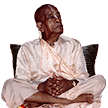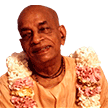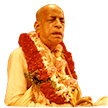Prakrti - an essential subject: Difference between revisions
Nayanranjani (talk | contribs) (Created page with "Category:Essential Subjects <!----------------------- edit below this line -----------------------> <!------------------------ begin introduction text below ------------...") |
(Vanibot #0041: Moves Choose Another box to the end) |
||
| Line 2: | Line 2: | ||
<!----------------------- edit below this line -----------------------> | <!----------------------- edit below this line -----------------------> | ||
<!------------------------ begin introduction text below ------------------------> | <!------------------------ begin introduction text below ------------------------> | ||
The sanskrit word for 'nature' is 'prakriti'. According to spiritual science, God is the creator of this universe and is therefore termed as 'purusa' (the source of energy). It follows then that this material world and all its inhabitants have to be inferior to this superior energy. Thus, we are all part of something known as 'prakriti', also known as the material nature. One may then conclude rightly that the manifestation of prakṛti may be temporary, but it is not false. Some philosophers say that the manifestation of material nature is false, but according to the philosophy of Bhagavad-gītā, this is not so. The manifestation of the world is not accepted as false; it is accepted as real, but temporary. | |||
Srila Prabhupada's books, lectures, conversations and letters offer a comprehensive presentation of this essential subject as seen in the Vaniquotes '''[[Vaniquotes:Category:Prakrti|Prakrti]]''' category. An introduction from his books is given below in the following | Srila Prabhupada's books, lectures, conversations and letters offer a comprehensive presentation of this essential subject as seen in the Vaniquotes '''[[Vaniquotes:Category:Prakrti|Prakrti]]''' category. An introduction from his books is given below in the following 8 quotes. | ||
<!-------- end introduction text and don't touch next three lines ---------> | <!-------- end introduction text and don't touch next three lines ---------> | ||
---- | ---- | ||
== Quotes from Srila Prabhupada's books == | == Quotes from Srila Prabhupada's books == | ||
<!----------------- edit quote boxes below this line -----------------> | <!----------------- edit quote boxes below this line -----------------> | ||
{{VaniQuotebox| | {{VaniQuotebox|A child is begotten by the combination of prakrti, the enjoyed, and purusa, the enjoyer. In the same way, whatever we see in the phenomenal world is produced by this combination of ksetra and ksetrajna|Rice paddy is produced by the action and reaction of the field and the tiller, or a child is begotten by the combination of prakṛti, the enjoyed, and puruṣa, the enjoyer. In the same way, whatever we see in the phenomenal world is produced by this combination of kṣetra and kṣetrajña. '''(Message of Godhead, Chapter 1)'''}} | ||
{{VaniQuotebox| | {{VaniQuotebox|Actually every living entity is prakrti, or female, and Krsna is the only husband|Because we have the desire to marry, Kṛṣṇa mercifully allows the so-called husband to possess a wife, and the wife to possess a so-called husband, for mutual satisfaction. In the Īśopaniṣad it is said, tena tyaktena bhuñjīthā: (ISO 1) the Lord provides everyone with his quota. Actually, however, every living entity is prakṛti, or female, and Kṛṣṇa is the only husband. '''(Śrīmad-Bhāgavatam 5.18.19)'''}} | ||
{{VaniQuotebox| | {{VaniQuotebox|Material nature has no power to create without the power of the purusa, just as a prakrti, or woman, cannot produce a child without the connection of a purusa, or man. The purusa impregnates, and the prakrti delivers|The atheist does not believe in the creator, but he cannot give a good theory to explain the creation. Material nature has no power to create without the power of the puruṣa, just as a prakṛti, or woman, cannot produce a child without the connection of a puruṣa, or man. The puruṣa impregnates, and the prakṛti delivers. We should not expect milk from the fleshy bags on the neck of a goat, although they look like breastly nipples. Similarly, we should not expect any creative power from the material ingredients; we must believe in the power of the puruṣa, who impregnates prakṛti, or nature. '''(Śrīmad-Bhāgavatam 1.3.2)'''}} | ||
{{VaniQuotebox| | {{VaniQuotebox|Nature (prakrti) is so strong that no one can overcome her stringent laws|In the history of the world, no one has been successful in conquering these miseries imposed by material nature. Nature (prakṛti) is so strong that no one can overcome her stringent laws. So-called scientists, philosophers, religionists and politicians should therefore conclude that they cannot offer facilities to the people in general. They should make vigorous propaganda to awaken the populace and raise them to the platform of Kṛṣṇa consciousness. '''(Śrīmad-Bhāgavatam 7.9.19)'''}} | ||
{{VaniQuotebox| | {{VaniQuotebox|These (pradhana and purusa) may also be described as para prakrti and apara prakrti, as stated in Bhagavad-gita. Krsna, being the controller of both the prakrtis, is thus the master of pradhana and purusa|Brahman is the resort of the mahat-tattva, which includes all material and spiritual entities. It is described in this connection that the Supreme Brahman, the Personality of Godhead, is the master of both pradhāna and puruṣa. Pradhāna means subtle matter, such as ether. puruṣa means the spiritual spark living entities who are entangled in that subtle material existence. These may also be described as parā prakṛti and aparā prakṛti, as stated in Bhagavad-gītā. Kṛṣṇa, being the controller of both the prakṛtis, is thus the master of pradhāna and puruṣa. '''(Śrīmad-Bhāgavatam 4.8.78)'''}} | ||
{{VaniQuotebox| | {{VaniQuotebox|From Bhagavad-gita we must learn what God is, what the living entities are, what prakrti is, what the cosmic manifestation is, how it is controlled by time, and what the activities of the living entities are|In the Bhagavad-gītā the subject matter deals with the īśvara, the supreme controller, and the jīvas, the controlled living entities. Prakṛti (material nature) and time (the duration of existence of the whole universe or the manifestation of material nature) and karma (activity) are also discussed. The cosmic manifestation is full of different activities. All living entities are engaged in different activities. From Bhagavad-gītā we must learn what God is, what the living entities are, what prakṛti is, what the cosmic manifestation is, how it is controlled by time, and what the activities of the living entities are. '''(Bhagavad-gītā, Introduction)'''}} | ||
{{VaniQuotebox| | {{VaniQuotebox|The impersonalists take Brahman to be the root of this material tree, and from the root, according to Sankhya philosophy, come prakrti, purusa, then the three gunas, then the five gross elements, then the ten senses, mind, etc|This tree, being the reflection of the real tree, is an exact replica. Everything is there in the spiritual world. The impersonalists take Brahman to be the root of this material tree, and from the root, according to Sāṅkhya philosophy, come prakṛti, puruṣa, then the three guṇas, then the five gross elements (pañca-mahā-bhūta), then the ten senses (daśendriya), mind, etc. In this way they divide up the whole material world into twenty-four elements. '''(Bhagavad-gītā 15.1)'''}} | ||
{{VaniQuotebox| | {{VaniQuotebox|The individual soul has awareness in accord with his material body, which he attains by virtue of prakrti, or material nature|The Supreme Personality of Godhead constantly lives with the individual soul as Paramātmā. The individual soul has awareness in accord with his material body, which he attains by virtue of prakṛti, or material nature. The material ingredients are activated by the force of time, and thus the three material modes of nature are manifested. According to his association with the three modes of nature, the living entity develops a particular type of body. '''(Śrīmad-Bhāgavatam 4.21.35)'''}} | ||
<!----------------- edit quote boxes above this line -----------------> | <!----------------- edit quote boxes above this line -----------------> | ||
| Line 31: | Line 31: | ||
'''Prakrti - [[Vaniquotes:Category:Prakrti|explore more within this category]]'''. | '''Prakrti - [[Vaniquotes:Category:Prakrti|explore more within this category]]'''. | ||
{{EsentialSubjectTotal}} | {{EsentialSubjectTotal}} | ||
<div style="float:left;"> | |||
{{EssentialSubjectnav}} | |||
</div> | |||
__NOTOC__ | __NOTOC__ | ||
__NOEDITSECTION__ | __NOEDITSECTION__ | ||
Latest revision as of 17:10, 22 November 2020
The sanskrit word for 'nature' is 'prakriti'. According to spiritual science, God is the creator of this universe and is therefore termed as 'purusa' (the source of energy). It follows then that this material world and all its inhabitants have to be inferior to this superior energy. Thus, we are all part of something known as 'prakriti', also known as the material nature. One may then conclude rightly that the manifestation of prakṛti may be temporary, but it is not false. Some philosophers say that the manifestation of material nature is false, but according to the philosophy of Bhagavad-gītā, this is not so. The manifestation of the world is not accepted as false; it is accepted as real, but temporary.
Srila Prabhupada's books, lectures, conversations and letters offer a comprehensive presentation of this essential subject as seen in the Vaniquotes Prakrti category. An introduction from his books is given below in the following 8 quotes.
Quotes from Srila Prabhupada's books
Prakrti - explore more within this category.
Vanipedia has now over 903 introductory articles compiled from Srila Prabhupada's books under the series titled Essential Subjects. All these articles can be seen in the Table of Content on the right side of this article and also here in this Umbrella Category. Browse through them to relish the breadth and depth of Srila Prabhupada's teachings - There is a subject for everyone.







